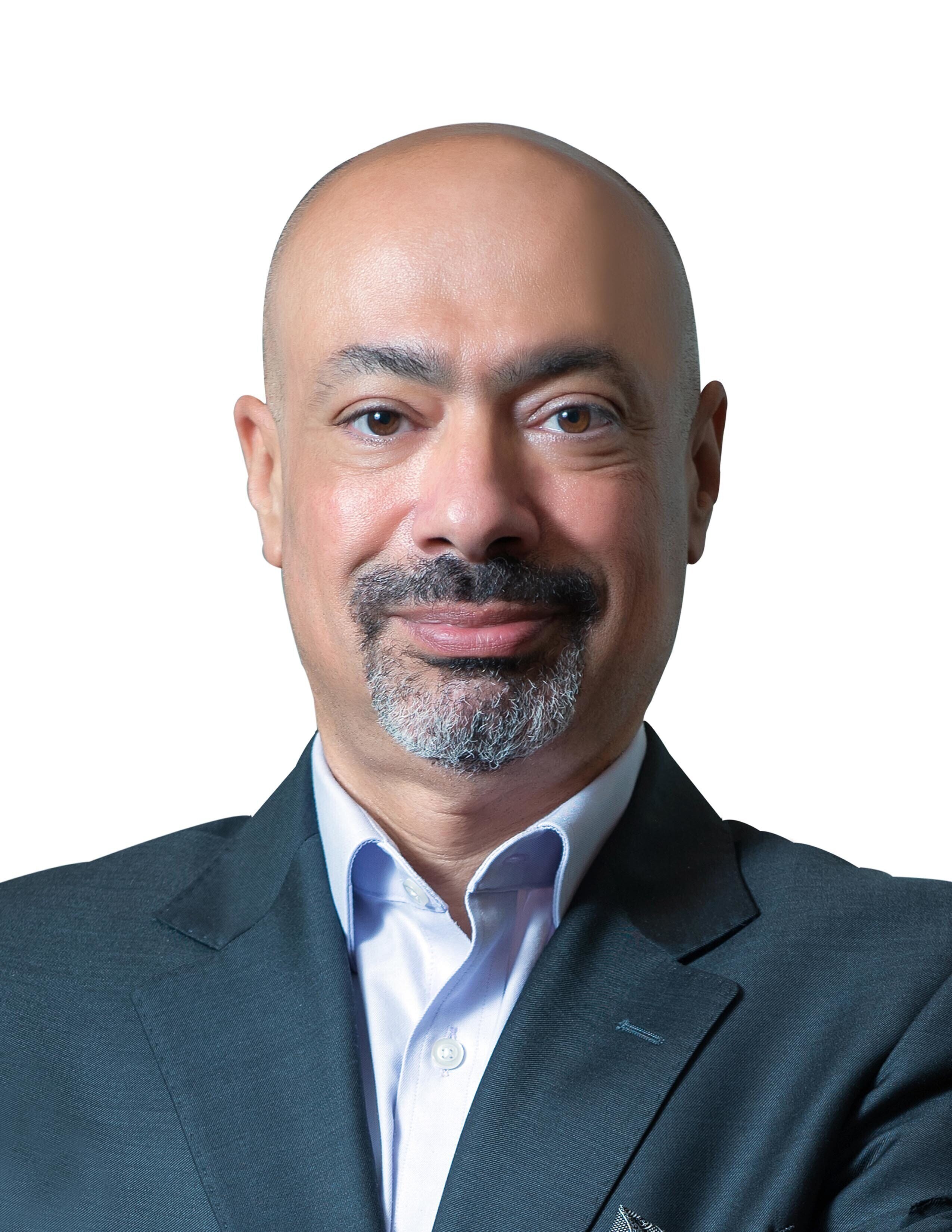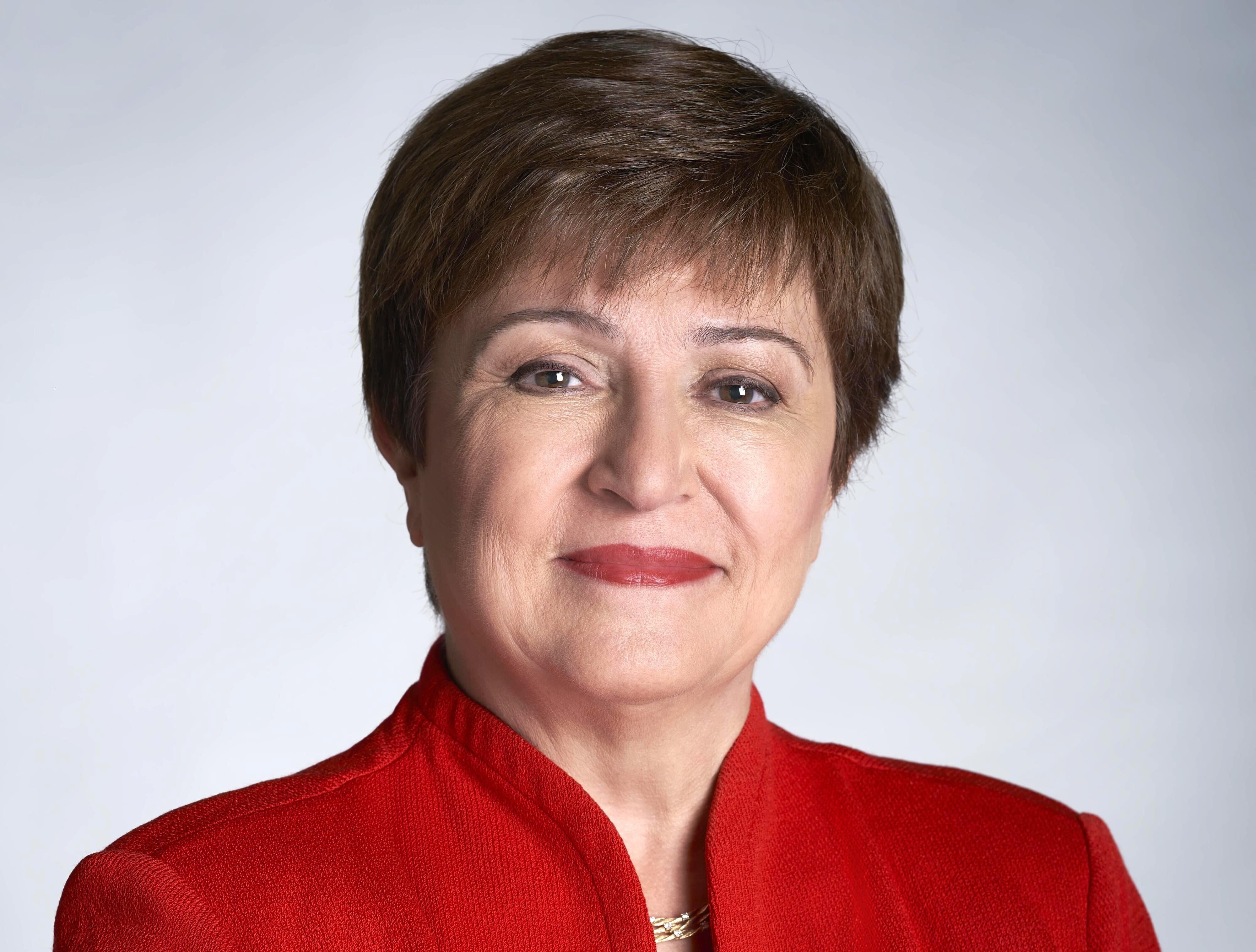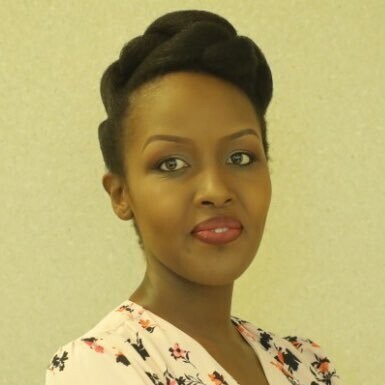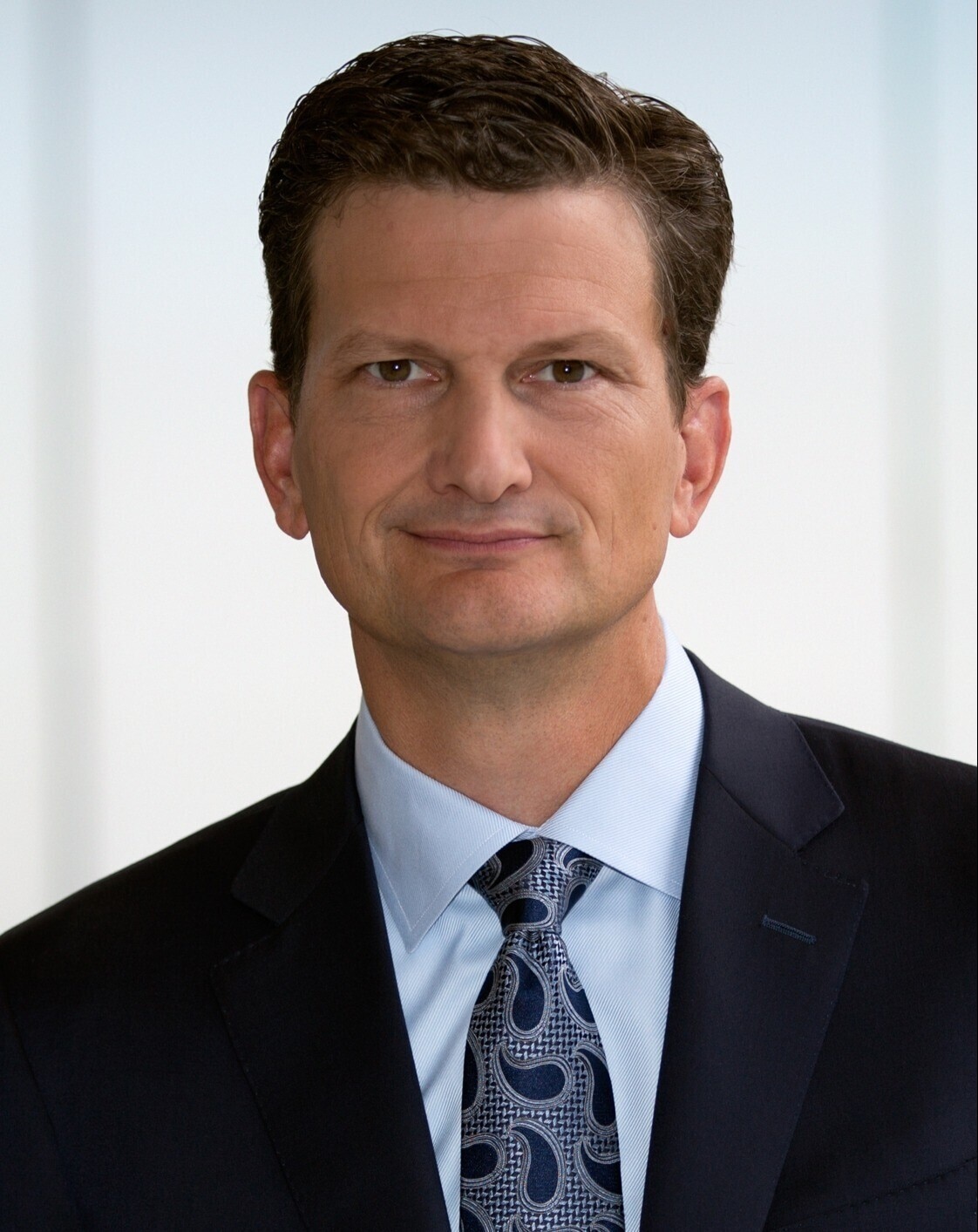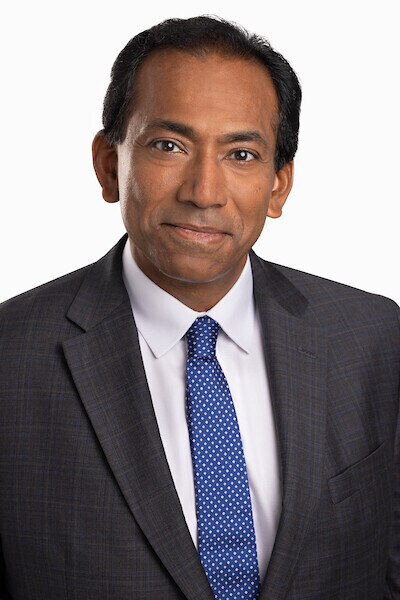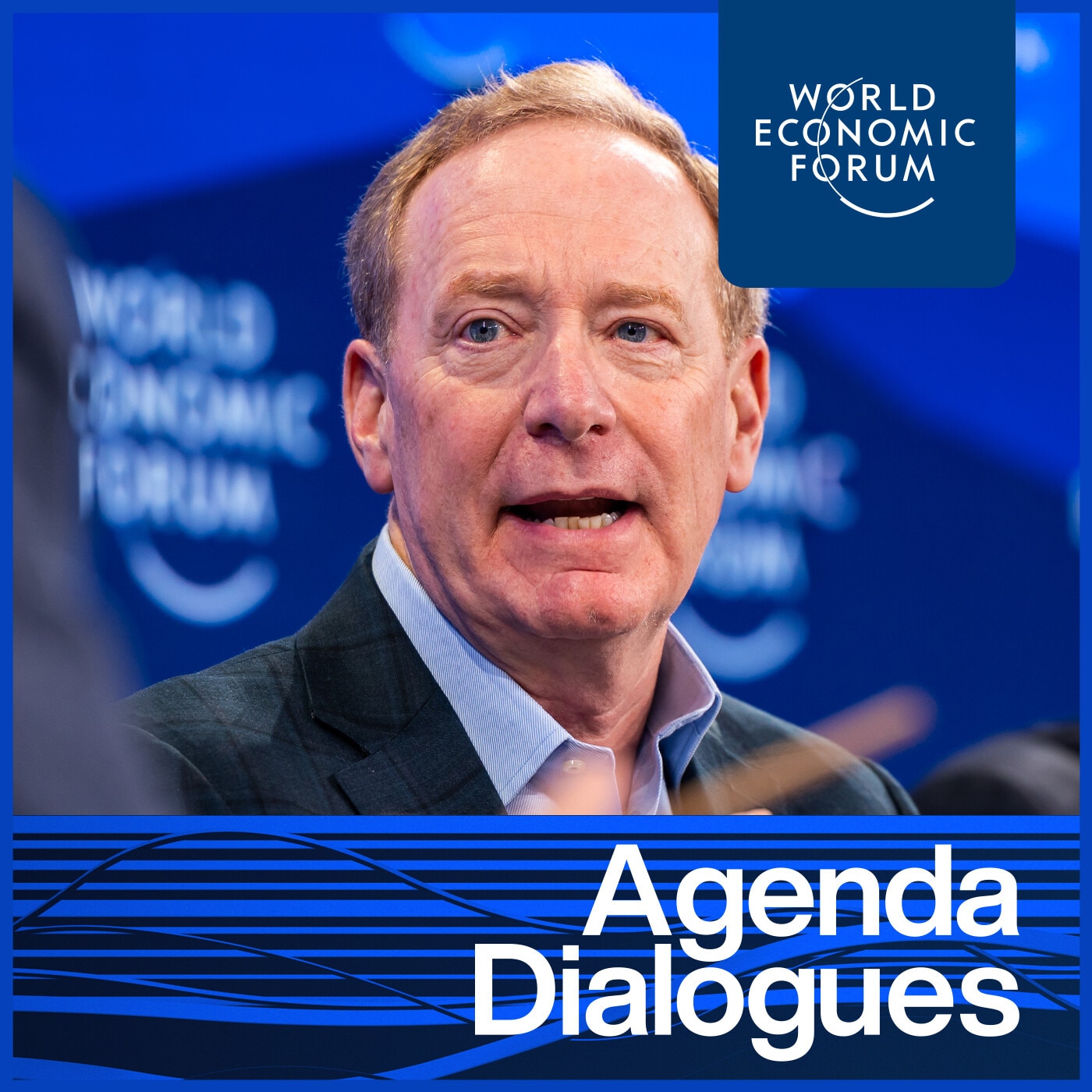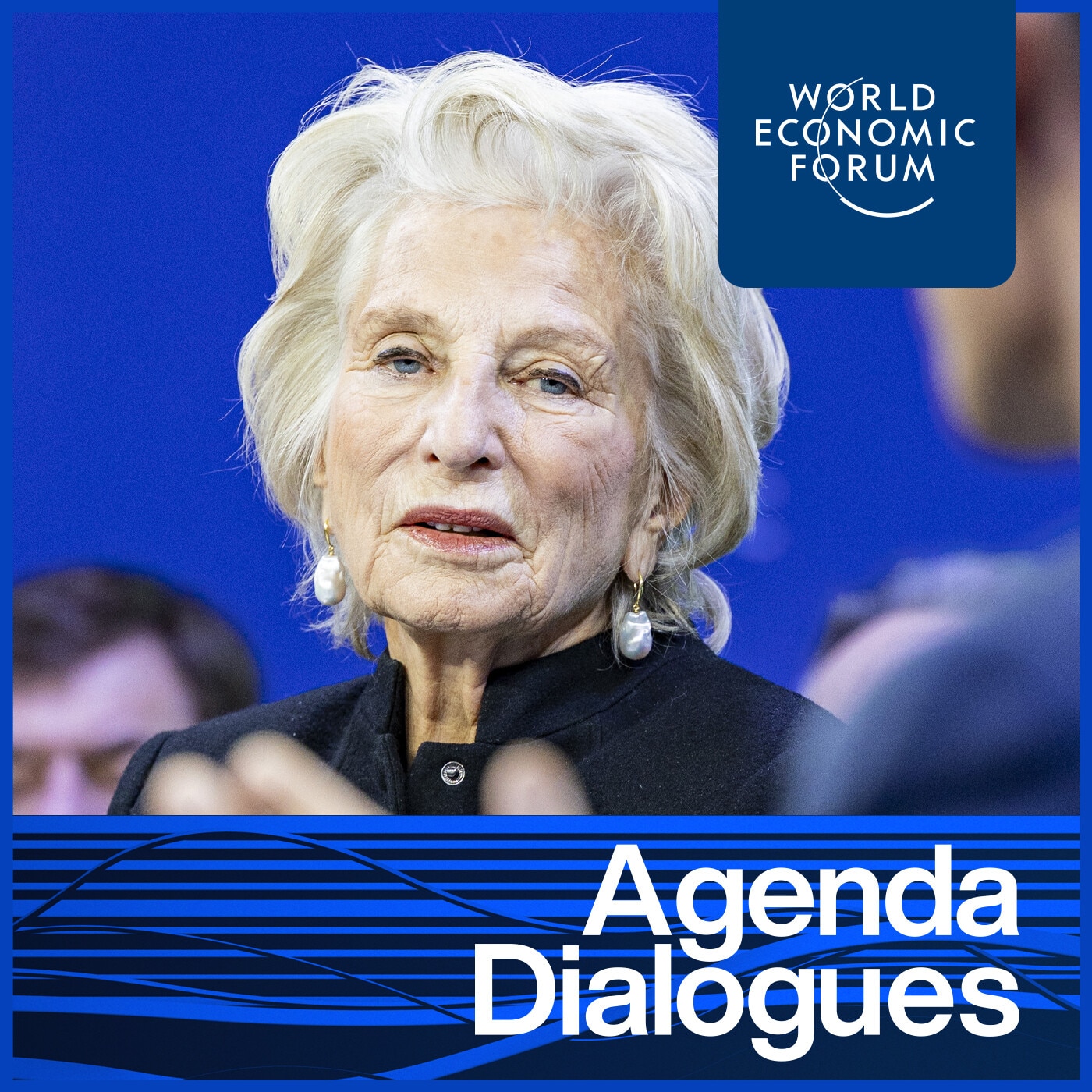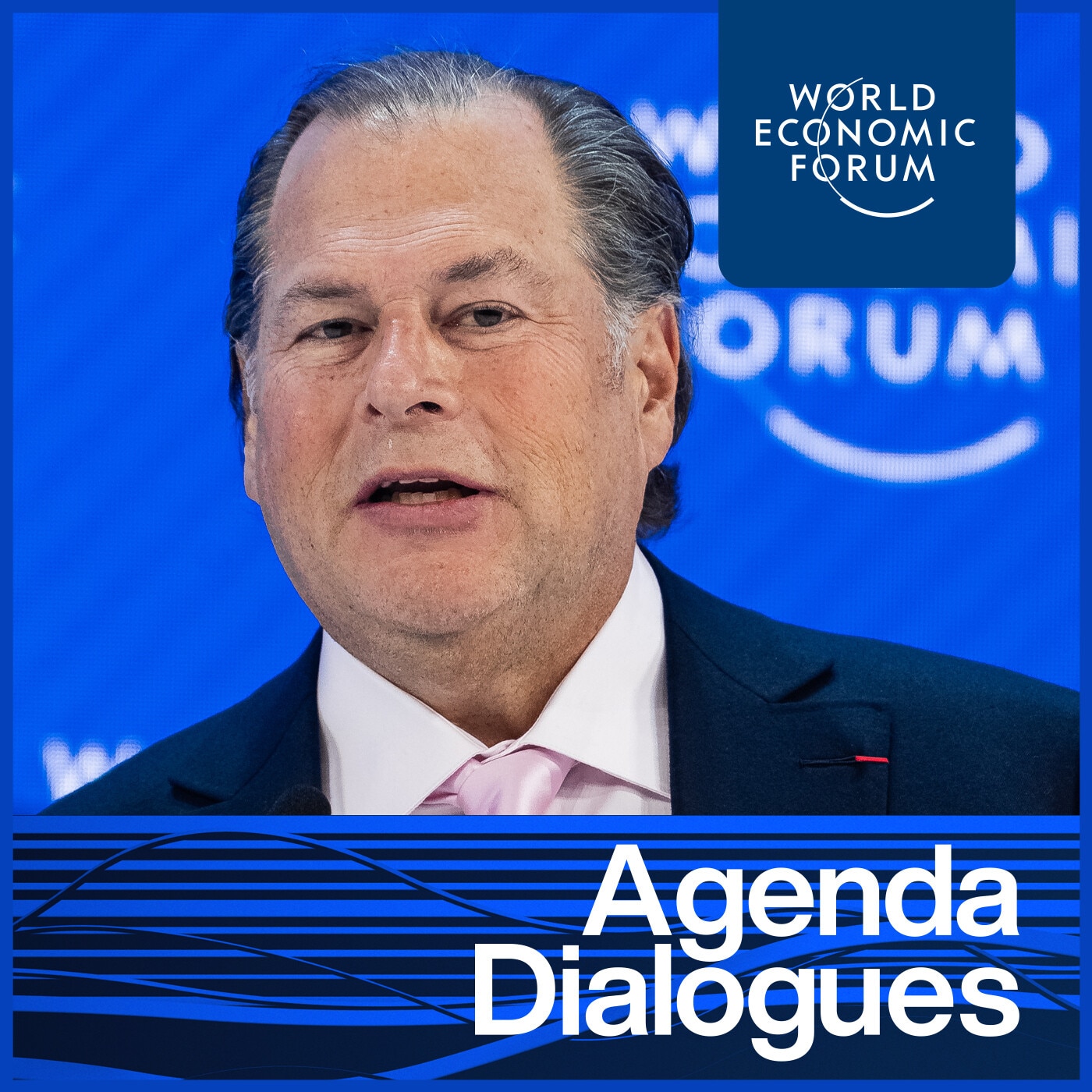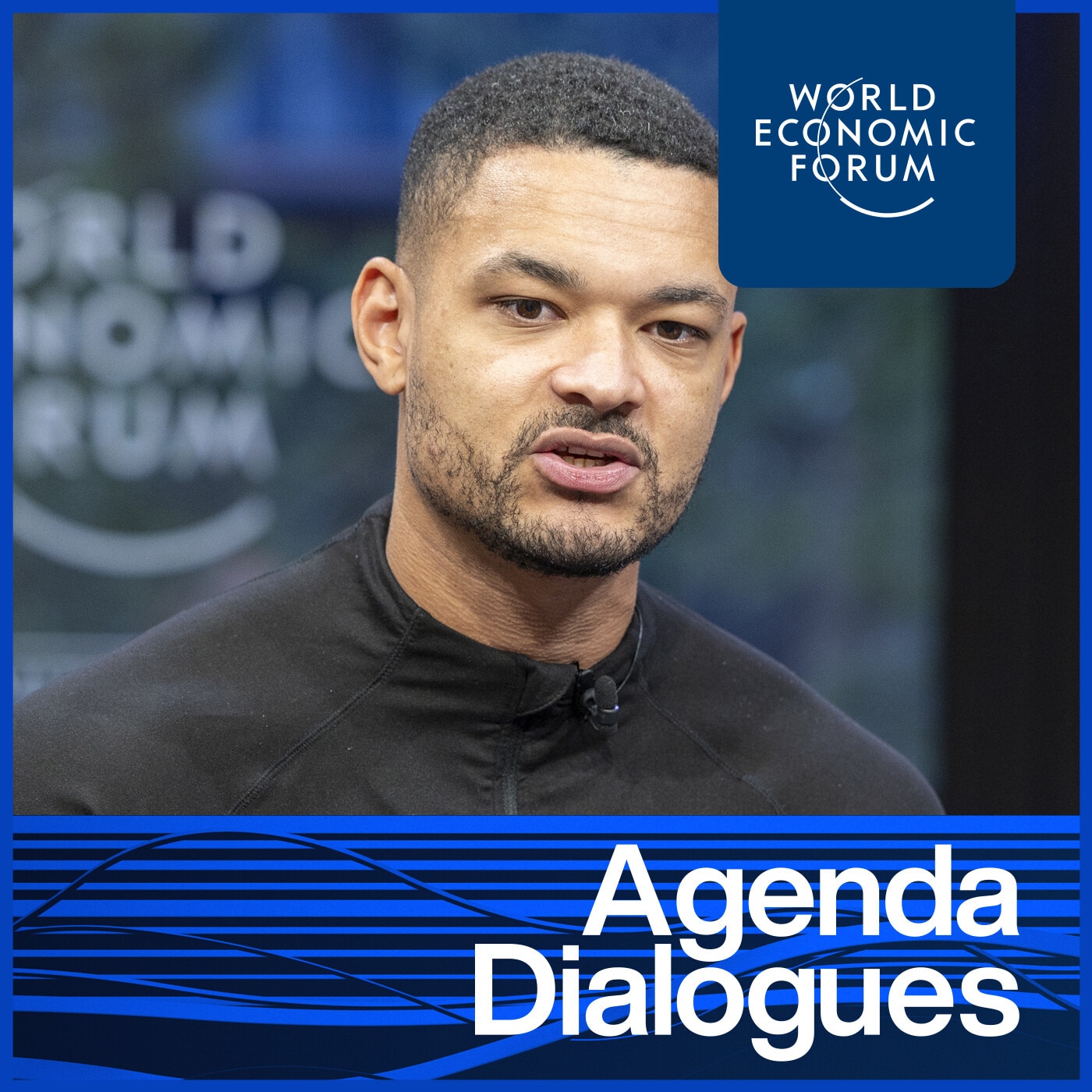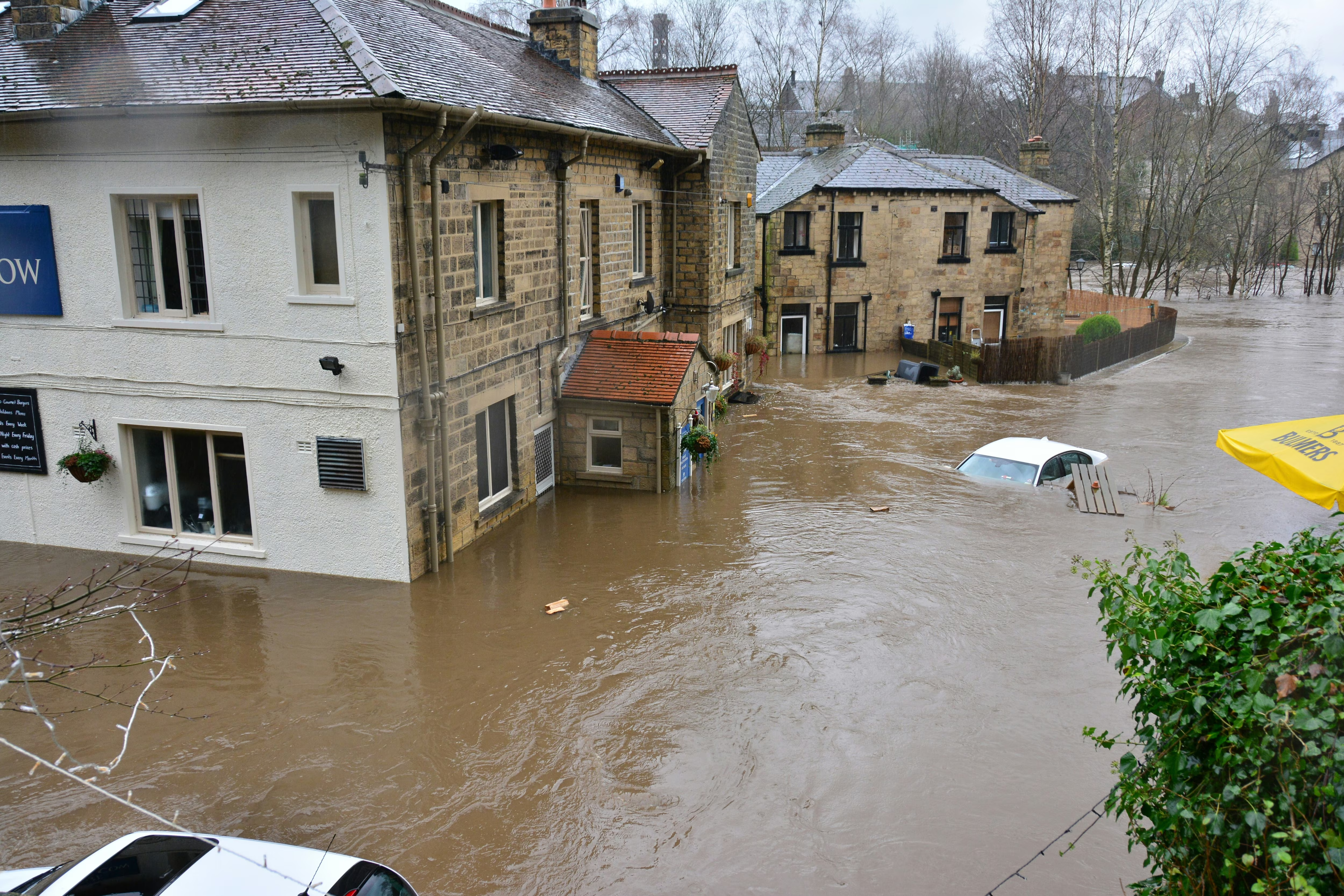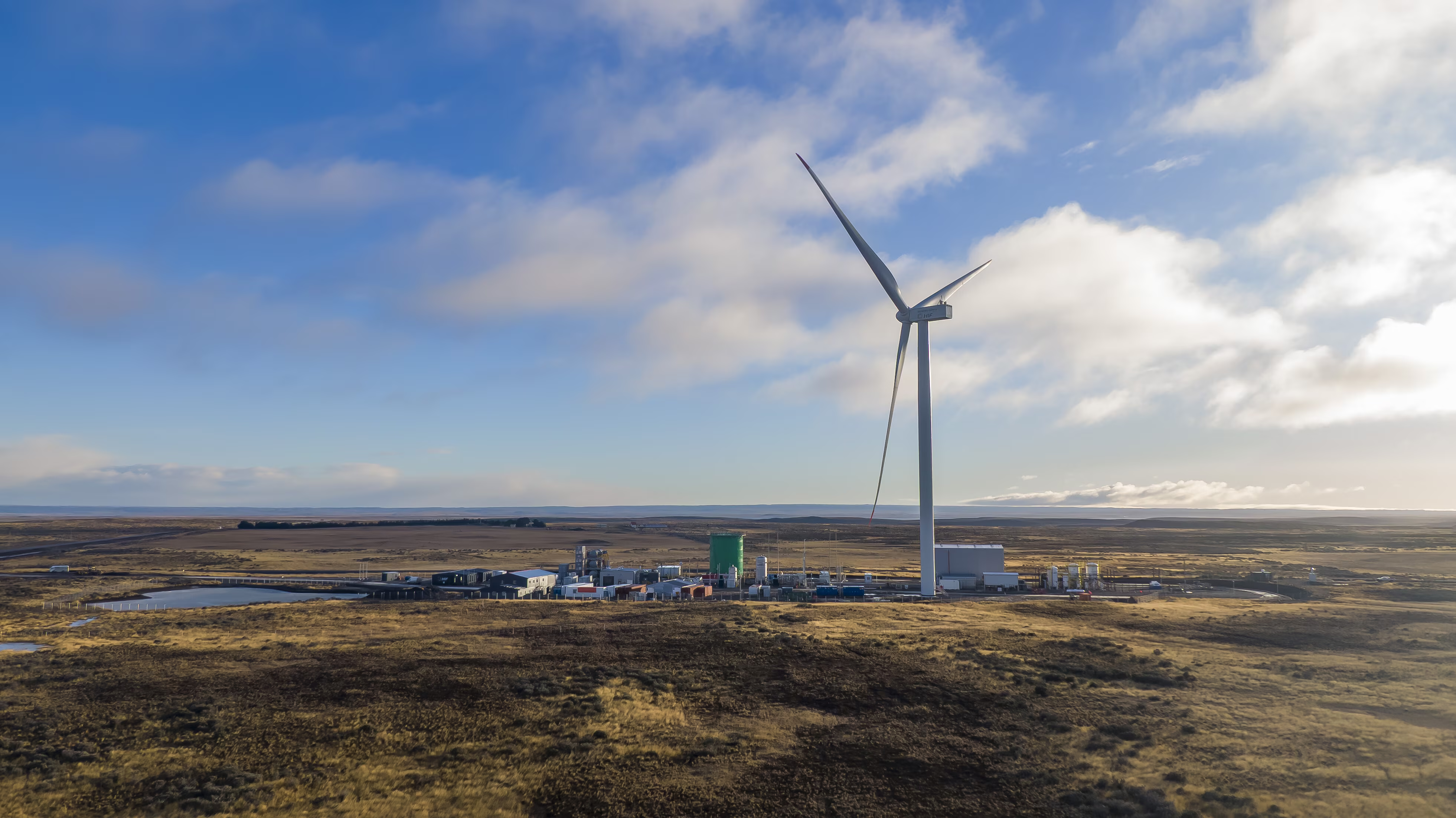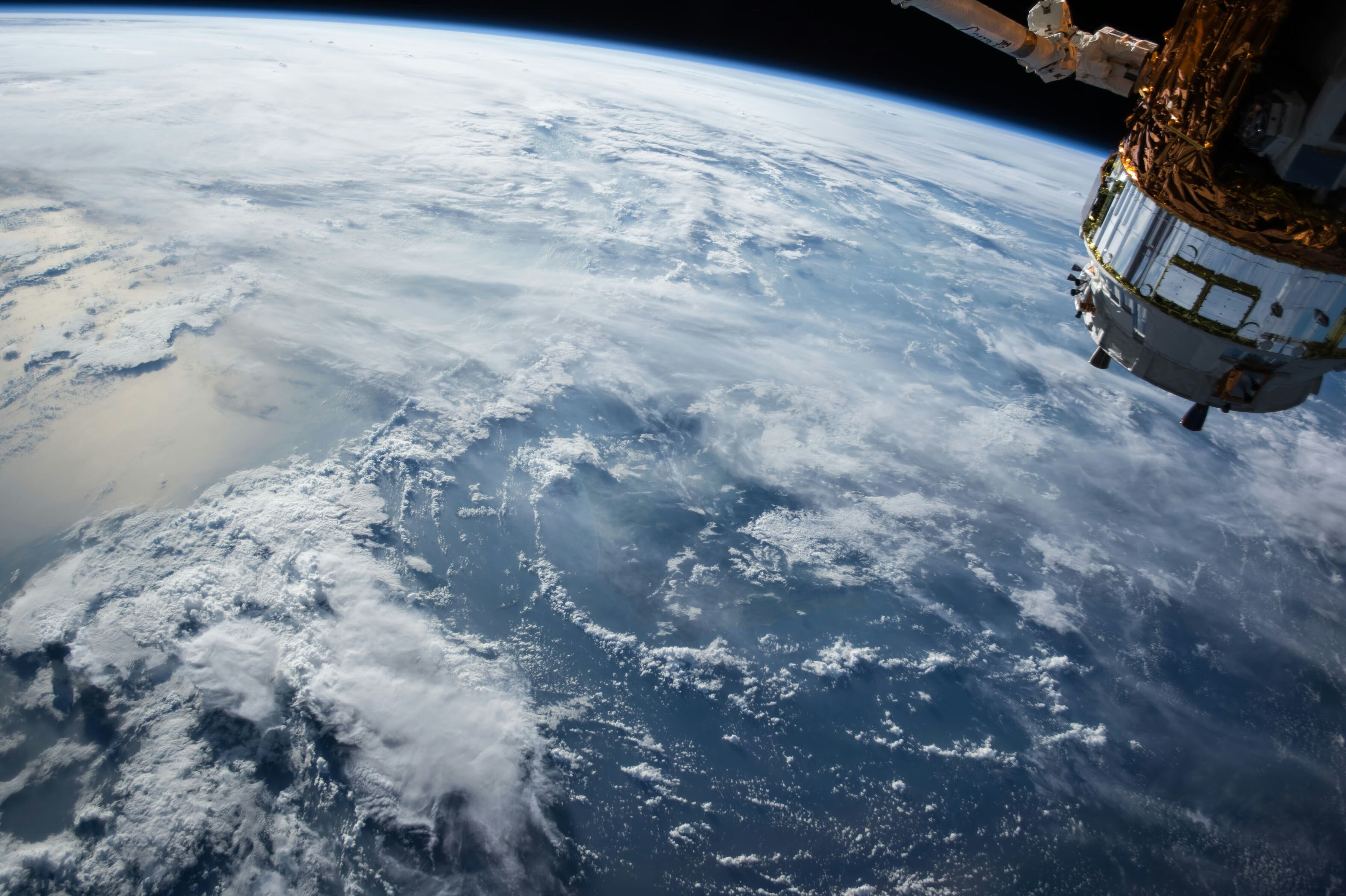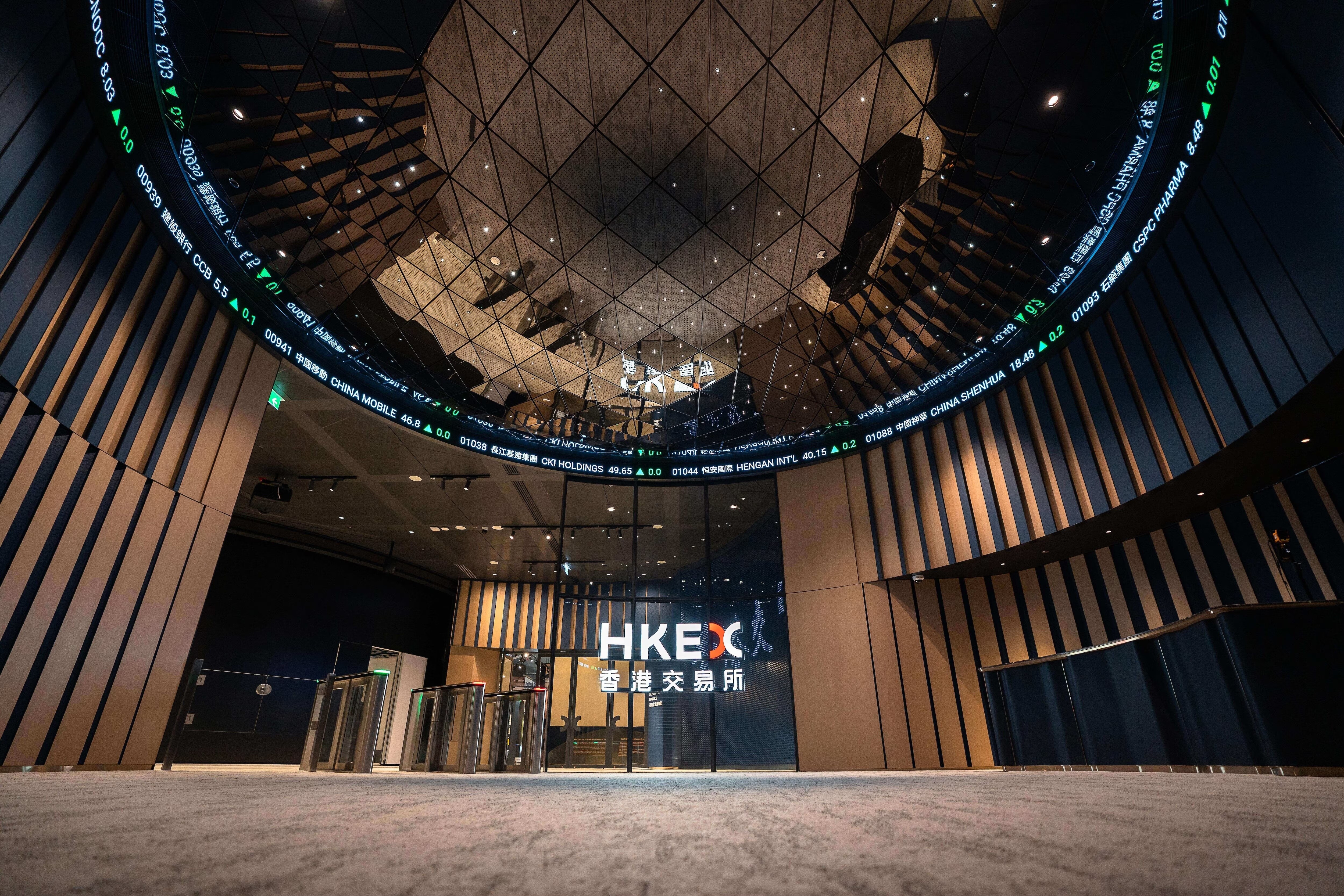AI Lifting all Boats
Transcripción del podcast
Vijay Vythianathan Vaitheeswaran, Editor, Global Energy and Climate Innovation, The Economist
Welcome, ladies and gentlemen, to our session on AI: Lifting All Boats. I am Vijay Vaitheeswaran, I’m the Global Energy and Climate Innovation Editor of the Economist. And it is my great honour to be your immoderate moderator today, for what I promise you will be a lively and I hope, provocative and educational session as well in thinking about AI.
I know there's no shortage of AI sessions here at Davos or indeed any other conference we all have been to in the last year or two. But I think this topic may be the most important of all of them for us to think about, because it deals with a much bigger frame in thinking about AI.
The topic is of course, how can AI not fall into the trap of the digital divide that we've seen over the years with the internet and energy access, which 100 years on continues to be a challenge in parts of the world for basic electricity, but rather maybe serve as that ability to lift many boats, indeed all boats, rather than being, as Coleridge1 once observed, that there might be water, water everywhere, but not a drop to drink. We don't want that outcome, I think we can all agree on that.
So to help us dig into this meaty topic and what I think that really is one that sometimes tends to get ignored in some of the geopolitical discussions or in some of the challenges about the actual technology itself and guardrails. I'm delighted to have a wonderful panel.
To my immediate left, we have Dr Kristalina Georgieva, Managing Director of the IMF.
To her left is the Honourable Paula Ingabire, Minister of Information, Communication, Technology and Innovation of Rwanda.
We have Hatem Dowidar, who is the Group Chief Executive Officer of e& (Etisalat), and we have Bill Thomas, Global Chairman and CEO of KPMG.
And to my far left, Brad Smith, Vice-Chair and President of Microsoft.
Please give them a nice round of applause to warm them up, get them going. Great, maybe Dr Georgieva, I'll start with you. The IMF has thought hard about this problem. You've got a stream of research that's already been looking at AI and its effects, its diffusion, some of the challenges that there might be.
There was some early hope that AI would be different, that somehow we saw some early productivity gains among, for example, frontline employees being able to catch up or maybe a chance for emerging economies to leapfrog, there was the hope. You have research coming out in a few months, but you can give us a preview. What are your economists finding?
Kristalina Georgieva, Managing Director, International Monetary Fund (IMF)
The good news is that our research shows that the potential of AI to lift global growth is significant. We are at the point when there is one universal common theme across all continents, with the exception of the United States, that growth is simply insufficient to give people and businesses the perspective they aspire for. So we have growth at around 3%. It used to be 3.8 and here is the good news. AI can lift growth up by 0.8%.
The second part of our research, however, shows that there is very different degree in preparedness, in exposure, in access. We have created a very interesting AI preparedness index that ranks countries on their digital technology now, in other words, physical connectivity. Labour markets, how well they're prepared for it. Regulation is there good definition of how AI can benefit society? And what it shows is that the accordion between advanced economies and emerging market developing countries is wide open.
It is also a problem when it comes down to exposure to AI. 60% of jobs in advanced economies are exposed to AI positively, they can see lifting up in productivity or negative, they may be gone. That goes down to 40% for emerging markets, it goes down to 26% in low-income countries.
And the third one that is the most troubling is when we look into the opportunity to translate this whole wonderful thing called AI into growth, and that is the newest research we will be delivering. There is a very significant, about 50% gap between advanced economies and low-income countries. So you said we want to close this gap.
Vijay Vythianathan Vaitheeswaran, Editor, Global Energy and Climate Innovation, The Economist
Right.
Kristalina Georgieva, Managing Director, International Monetary Fund (IMF)
We can talk about ways to close it. But I want to make one point in the very beginning, because we talk about boats, and water. And yes, there could be water. But if you don't have a boat, all this conversation doesn't matter. And my worry is that in developing countries, we still have a very significant part of the economy and people, to whom this conversation about lifting up boats is a bit theoretical.
Vijay Vythianathan Vaitheeswaran, Editor, Global Energy and Climate Innovation, The Economist
Okay. So you sketched out the challenges. Now, some of these, it must be noted, or at least it seems to me, are not unique to AI. It isn't because this is one of those revolutionary general-purpose technologies that comes along once in many decades or centuries, like the steam engine or electricity itself, grid electrification. It's the things you're talking about are perhaps characteristics of emerging markets with imperfect infrastructure.
Almost a billion people don't have access to modern energy. So if you're spending, usually girls and women walking miles a day to fetch crop residue or cow dung, it's a bit crazy to say you're going to become a big winner from the internet economy, or at least in making AI manufacturing the AI process. But could you be a beneficiary if we're able to develop products and services that give advance warning of weather and disaster, for example, in a more rapid basis that's delivered to a smartphone in the village so that everyone has a warning?
Are there ways we can find around this? Because if you say you must electrify everything before AI can help you, we've been waiting 100 years and I know there are initiatives there, but I would hope that's not the only pathway.
Kristalina Georgieva, Managing Director, International Monetary Fund (IMF)
You're so right. And that is the attractiveness, that there is so much that consuming AI can deliver to people just on the basis of having a cell phone. You can have diagnostics of your health problem. You can have better access to educational materials. We talked about early warning systems, when to, you know, get your crop to market.
All these things you can, you can have a phone. What I'm talking about is translating AI into an integral part of economic growth. And there it is not enough to just have a phone because producing data or running the systems, that is going to be a much more complicated and energy consuming proposition.
Vijay Vythianathan Vaitheeswaran, Editor, Global Energy and Climate Innovation, The Economist
That's a fair point, of course. And so going beyond being beneficiaries of these technologies, how to be a part of the AI economy, a part of the creator economy and benefit and increase national productivity, I think, Minister Ingabire, you've thought a lot about this. You've already taken some actions in your country which has got a good record on digital.
Can you tell us your perspective on how you can continue that success in thinking about extending it to AI? What's different about AI, or is it really a continuation of some things that you've been able to do successfully thus far?
Paula Ingabire, Minister of Information, Communication, Technology and Innovation, Ministry of Information, Communication, Technology and Innovation of Rwanda
I would like to pick up from what Kristalina was talking about growth. We have done a study to look at what would be the impact of AI in Rwanda. And what we are seeing is, and I think you talked about 0.8%, what we are seeing is even with basic use cases that we can deploy, we are seeing a potential to create at least 6% of GDP contribution. And so we've been able to map out the different use cases.
We talk about early warning, you know, systems for farmers. Farmers make up the largest percentage of our population and you see that trend similar across the continent. We're talking about public administration use cases, whether it's from taxes or the Social Security claims, and really being more efficient with how we're using some of these tools. And to your point, Vijay, this is going definitely is going to be a continuation of the already existing foundations that we've put in place in, you know, digital transformation efforts.
It also means that we’re going to have to think differently on how we continue to close the gap on some of the digital aspects. So it's making sure that everyone is connected, today we have about 93% population coverage, but we still have a gap on usage and the usage gap is driven largely by digital skills, by access to affordable devices and affordable internet connectivity. But at the same time, we're also going to be combining those efforts with energy access.
Rwanda today has 81% household access to electricity. But when we start to look at what these AI use cases that we're going to put in place, we start to anticipate what the demand is going to look like. And that has called for different ways on how we leverage that. And so for Rwanda, we're building on these foundations that are already in place. But at the same time, asking also the question, how do we not lag far too behind on this AI journey?
Vijay Vythianathan Vaitheeswaran, Editor, Global Energy and Climate Innovation, The Economist
And there has been some analysis that looks at the effects of individual countries that may have one shortfall or another, might be skills, it might be infrastructure, might be data collection. And the WEF actually put out an interesting report on this on AI competitiveness through regional collaboration, which I recommend to all of you.
What do you see as the prospects or potential for regional collaboration? I know there are a lot of sensitivities at the national level, this is the age of national sovereignty. We see this among the big boys, as it were. And is there opportunity for emerging economies maybe to collaborate in order to step up that ladder?
Paula Ingabire, Minister of Information, Communication, Technology and Innovation, Ministry of Information, Communication, Technology and Innovation of Rwanda
Absolutely. And we are already seeing that happen. Last year, we worked with Singapore to put in place a playbook for small states and how we can really, you know, create a proper roadmap on how we build the foundations for the AI economy. We are seeing this even within the Commonwealth member states, you know, creating that kind of coalition, which is very important.
Now I want to give you an example. When you talk about regional collaboration, at the end of the day, collaboration is very important for developing countries because it helps you to address the resource constraints that you already have. So whether it's from an energy perspective, whether it's from any other kind of resource compute and event data. So we are seeing, at least on the African continent through Smart Africa2 and different institutions where we're now starting to work on frameworks that allow for cross-border data flow. And that's going to be very important open data access in terms of making sure you have lots of data that you can train these models on.
And I'll end on this one where regional collaboration comes into play in a very powerful way is when we look at what our energy demand is going to be in terms of AI workloads. We cannot close you know, we cannot satisfy the demand in the short term. So we are really working with the East African community in an East African, you know, energy pool. So if there's excess capacity in any of the countries and one country has a sudden demand for, you know, for energy because of the AI workloads, then we are suddenly able to do that.
Vijay Vythianathan Vaitheeswaran, Editor, Global Energy and Climate Innovation, The Economist
Well, it’s promising to see these advances, because, of course, historically Africa has found it challenging, to have trade across borders or even have visa-free travel. This has been a real challenge. So to see some of these some of these bits of progress and hopefully on the digital front, we could start off on a better footing. And I do believe we have a summit coming up in April to try to take on some of these issues so people who are interested could follow up on that. I want to come to Hatem.
Hatem, you can give us a private sector view. Very interestingly, of course, your company has its base in the Middle East, but you've got extensive operations in Africa, and I just discovered today in Eastern Europe as well, so you've got the cross-country perspective and the bottom-up perspective. What do you see as the principal challenges, as we've seen the macro sort of challenges laid out by Dr Georgieva. What do you see from the outside view, as it were?
Hatem Dowidar, Group Chief Executive Officer, e& (Etisalat)
Okay, so I think there are you know, across the markets we work, there are several buckets of countries. So some of our markets, like our home markets in the UAE and in Saudi. We have the capital, we have the connectivity, super well-connected networks, as well as having the energy at an affordable price. So some of these markets would be ideal to build data centres that you're able to not only use, but also teach the models and improve the models and so on.
Vijay Vythianathan Vaitheeswaran, Editor, Global Energy and Climate Innovation, The Economist
And you also have very strong national policy support in those apps.
Hatem Dowidar, Group Chief Executive Officer, e& (Etisalat)
Absolutely, and we have cooperation with many companies across the world. In fact, Microsoft has a big partnership in the UAE that, is exactly working on this. And then you have other countries that maybe have the energy but don't have the access to the know-how and the connectivity. And then some that are actually lacking on both. And there is definitely still a possibility to do this because there's the less energy that is needed to actually access AI and a lot of energy that is needed to teach the AI. So there is a possibility where you can have these central areas where we can serve the countries that don’t have the massive energy needed to teach the models.
But then we need to relax the AI data sovereignty issues that we discuss. And there are technologies available now that allows you to have ring-fenced data in other countries where you can still preserve the integrity and the sovereignty of this data. And I think this mindset is very important for regulators to be able to, actually close the divide rather than widen it.
And we have been working in the World Economic Forum as part of the EDISON Alliance3 in connecting people. We actually celebrated that, we connected a billion new users, which was something that a lot of the members of the Alliance worked for. Now we still have 2.6 billion that are unconnected and we need to really work on connecting them, because if they are not connected, they cannot use AI, they cannot use digital overall, so we need to connect them.
Vijay Vythianathan Vaitheeswaran, Editor, Global Energy and Climate Innovation, The Economist
Others, you know, this point you make about having the tools now to be able to ring fence data in a way that might satisfy national regulators. That sounds very important to me because what I know about regulators is they don't want to give up their national sovereignty, whether it's because of privacy rules or now increasingly involving AI and data sets and other in an era of geopolitical competition. Have you been able to persuade any particular lead markets that your tools or the tools that you're advocating can work? Who's on board with your plan?
Hatem Dowidar, Group Chief Executive Officer, e& (Etisalat)
Look, I mean, there are there are markets that work closely, let's say, have strong geopolitical ties. And I just don't want to say names, but we do have a couple of cases now where agreements have been done that allows for data to be handled securely in other markets. There are a few, let's say, lighthouse cases that allows this to happen. And actually some of the hyperscalers, Microsoft is one of them, AWS is another that are working on creating these ring-fenced sovereign clouds that can serve countries from another country while really preserving that integrity and sovereignty. So there are cases of that already happening.
Vijay Vythianathan Vaitheeswaran, Editor, Global Energy and Climate Innovation, The Economist
Okay, so there are some lighthouses, as in the WEF terminology. Brad, I saw you nodding vigorously and you've been called out by, by company name, so I'm going to give you the next chance to weigh in here. Obviously, you're a global company, but when you think about moving into markets outside of the United States, what are the considerations that help you make this decision?
We heard the UAE example, obviously, the governments very welcoming. But in emerging markets where they don't have all of the factors that have been ticked off so far. How do you weigh that decision? What can you do to help them? And when do you encourage sort of regional pooling of talents?
Brad Smith, Vice-Chair and President, Microsoft
Well, we are spending, as we've said, $80 billion worldwide this year to build out AI infrastructure. And, the reality is there's not a shortage of capital, to build out infrastructure. That's great news. And it's not just ours, you see, you know, Microsoft, MGX, which is also in the UAE, BlackRock. You know, we've created, separate from that $80 billion, a fund that is going to start probably at around $30 billion and we hope to grow to $100 billion. And there will be many other things. So we will go where there is demand. It's really that straightforward.
It's a very expensive, capital-intensive investment. If you can recoup the investment, you spend the money. Now, when you put this in the context of, call it, international economic development, because that's what it is, I think there's always two fundamental approaches to spur development. It's either increase supply or increase demand. A lot of what development banks deal with, I think, is when there's a shortage of capital. That's what they exist for. What we need here is a demand driven strategy. So how do we do that?
Well, Rwanda is a great example. Let's just look at East Africa. Earlier this year, Microsoft and G42 announced together that thanks to G42’s investment, we together would create a $1 billion data centre in Kenya. That is a market with 50 million people. It is hard to spend $1 billion to support 50 million people in Kenya alone. But we're, we're doing it. But the real question is, can we grow that? And can we reach Rwanda? We can, but only under one circumstance – that you get Rwanda and Tanzania and Uganda and Kenya and Ethiopia. You get the East African community to decide together that they will all use that data centre and they will put in place among them, you know, an agreement to, in effect, think of it as a data zone, just like we have free trade zones that will get us halfway there.
There's a second thing that I think is needed as well. In these countries, the only way to really kickstart demand is to have the government do it for itself, for its public sector services. These governments have data centres. They have certain typically on-prem services, move to the cloud, consolidate, you know, demand, stimulate demand, and then you will have not only one data centre, but you'll probably have an Amazon or a Google or an Alibaba or a Huawei come in.
Vijay Vythianathan Vaitheeswaran, Editor, Global Energy and Climate Innovation, The Economist
Right, but you're not advocating a DOGE4 for, for East Africa are you?
Brad Smith, Vice-Chair and President, Microsoft
No, but what is needed is demand. And the thing that will absolutely hold back, let's just say Africa, is if every country says I won't use a data centre unless it's in my own border.
Vijay Vythianathan Vaitheeswaran, Editor, Global Energy and Climate Innovation, The Economist
Sure.
Brad Smith, Vice-Chair and President, Microsoft
Because then it's you know, now you're back on the electricity timeline, which has been going on, now we're in decade number 15, for trying to bring electricity around the world.
Vijay Vythianathan Vaitheeswaran, Editor, Global Energy and Climate Innovation, The Economist
Right, you can make that argument in ASEAN as well, for example, in other regions.
Brad Smith, Vice-Chair and President, Microsoft
Exacly.
Vijay Vythianathan Vaitheeswaran, Editor, Global Energy and Climate Innovation, The Economist
There's a great divergence between some leaders and a lot of laggards that could benefit from cooperation. A fair point. Bill, let's come to you. You've heard the arguments aired. I know you, your team has worked with the WEF to put out some thought leadership on this. Give us the sharpest point from your analysis and which direction. Are you, is the boat sinking or is the boat being lifted?
Bill Thomas, Global Chairman and Chief Executive Officer, KPMG
Well, I would say...
Vijay Vythianathan Vaitheeswaran, Editor, Global Energy and Climate Innovation, The Economist
Or do we not even have a boat, as has been posited?
Bill Thomas, Global Chairman and Chief Executive Officer, KPMG
Well, the nice thing about going last is you get to tie a bunch of these things together. And I will say this. So we were really privileged to work with the WEF, but it's really working with the 200 members of the AI Governance like Alliance that commissioned the piece that said, “What does an intelligent economy look like?” And, and uh essentially to Kristalina’s point, what's the boat we're even talking about?
So Brad mentions, Brad mentions infrastructure. I'll tell you if, and I won't, I won't do it justice in the time I have. But if you look at that blueprint that we put out, you get to a foundational layer that I would just call the tech, of which one element is the infrastructure. It goes to what's, what's the financing for it? What's the data, What's the data model? What's the compute model? There's a whole layer there of which one thing is, is infrastructure. You go to the next layer and it says, what's the aspiration of the country? Or in in certain cases, the region? And it says, how are you going to really engage your, create the value, create the value from AI itself.
So making sure you understand what sectors of your economy you should like should go first to get the best benefit from and really create the value proposition that says this is why we want to go there. And then the last one, this is really a trust and growth story because that's the growth layer. The last one is all about trust our people and the governance that goes into making sure it's safe and the kinds of things we talk about. I will tell you, that's the boat.
The real question that we're talking about today. So I would encourage everybody to read the report, that gives you the boat. The real question is, one, not every country, by no means every country can build their own boat. And already we've talked about the fact that, that is impossible, absolutely impossible. Nor should that be the objective. So the real question is, so what? So are we going to you know, everybody has to have access to a boat, but not everybody is going to be able to build a boat. So let's start talking about how do we make sure everybody has access to a boat.
Vijay Vythianathan Vaitheeswaran, Editor, Global Energy and Climate Innovation, The Economist
Well-framed, and if I may just in the interest of provocation, since we've had our initial comments and before I come to the crowd for your thoughtful questions, maybe suggest that the greatest beneficiaries from AI may not necessarily be those that create it.
My last book on the history and future of innovation called Need, Speed and Greed, available at bookstores near you, made the point from research that the greatest beneficiaries of inventions throughout history, inventions that became value-creating innovations, are often not the inventor or even the company or the country that came up with something new, but where it was adopted and how it was diffused. And not only that, adapted, modified, improved, attracting local attention and meeting local needs. And in the case of Africa, we could take an African example. Everyone benefited from mobile phones, but it was in East Africa that M-Pesa developed mobile banking, pioneering the world in this area, right? And in some ways still leading many countries.
And so we can find leapfrogging innovations as well in the adoption and use of innovation. And so if I were to frame it in that way and equally, you know, most countries or very few countries invented email, but we all could benefit from it. The list can go on and on, on this. And if we look at the consumption and usage of AI for development, as it were, or any other purpose, national job creation. There might still be things lacking, right? You know, if you don't have access to electricity, it's very hard to talk about access to AI.
So if I were to frame the question as being beneficiaries of that and harnessing it to leapfrog ahead, what are the, what are the things that still need to be done? What's still missing? And that's a different question than… Brad, you immediately want to jump in there.
Brad Smith, Vice-Chair and President, Microsoft
In my opinion, just my opinion. But first of all, that your book is great. And there's, there's a there's another book that was published last year that looks historically and basically comes to the same conclusion called Technology and the Rise of Great Powers by a George Washington professor, named Jeff Ding. And it's the same conclusion. What really drives economic growth for countries is the adoption or diffusion of technology.
The second conclusion in his book, when you look at the three industrial revolutions, is that the most important infrastructure you actually then need is the educational infrastructure so that people have the skills to put the technology to use. Now you take that and you apply it to Africa. To me, the biggest shortage in Africa is actually data scientists. For every 14 data scientists you meet in Europe on a per capita basis in Africa, you'll meet only one.
Yeah, because if you can bring the capital in, stimulate the demand, then you will generate the data and put it to use, including in local languages. But only if you have data scientists. And the good news is, it costs a lot less money to train data scientists than it does to build data centres. But I would prioritize that.
Vijay Vythianathan Vaitheeswaran, Editor, Global Energy and Climate Innovation, The Economist
Yeah, Dr Georgieva.
Kristalina Georgieva, Managing Director, International Monetary Fund (IMF)
I very much like taking this direction to talk about, what would make Africa competitive in this area? And the most important message that came from you Brad, and actually I'm sure you would agree, is that individual countries, even the big countries in Africa, are going to lose if they don't figure out a way to work with others. And I want to make a broader point.
We are now in a more fragmented world. We no more have the aspiration of developing countries to succeed because they're part of integrated global economy and they can rely on exporting goods and services to others for their development. Countries need to think in this environment. What can they do. And to my mind, working more in regional and subregional settings is number one priority for countries to figure out ways to benefit from creating critical mass, but also creating regulation that they adopt. All of them, they operate by the same rules thinking of skills and capabilities, including the data scientists you're talking about as common public good. And all of us and I, and I put this also on us at the IMF. We all have to think, how can we support it?
I'll give you one example. At the IMF, we do occasionally regional-based economic assessment, and that is, mostly done, most frequently regularly done for the Eurozone. So we have annual consultations with the countries of the Eurozone because they share common currency. And I'm thinking of expanding that approach on economic opportunities, to groupings of countries where there is that desire, to succeed on the basis of creating that common objective and common resources and common public good.
You mentioned ASEAN. Absolutely, you guys in your neighbourhood, you have to, you have to do it. You have, otherwise, we can talk here until the cows go home, and progress won’t be made. And I have a question for the audience. How many in the audience are AI producers? You participate in generating the new economy of AI.
Vijay Vythianathan Vaitheeswaran, Editor, Global Energy and Climate Innovation, The Economist
Hands up, how many are, at companies…
Kristalina Georgieva, Managing Director, International Monetary Fund (IMF)
Raise, companies in that. Right.
Vijay Vythianathan Vaitheeswaran, Editor, Global Energy and Climate Innovation, The Economist
Okay, less than 10%.
Kristalina Georgieva, Managing Director, International Monetary Fund (IMF)
How many of you are AI consumers?
Vijay Vythianathan Vaitheeswaran, Editor, Global Energy and Climate Innovation, The Economist
Hands up, and how many actively try different tools? There we go.
Kristalina Georgieva, Managing Director, International Monetary Fund (IMF)
But I sort of rest my case.
Brad Smith, Vice-Chair and President, Microsoft
But there's another question, because I think those are great questions. How many of you have a phone, a smartphone, I assume everybody, right? Okay. If you have a smartphone, you are generating data.
Kristalina Georgieva, Managing Director, International Monetary Fund (IMF)
Yes, you participate.
Brad Smith, Vice-Chair and President, Microsoft
That is the fuel for AI.
Kristalina Georgieva, Managing Director, International Monetary Fund (IMF)
Yup, absolutely!
Brad Smith, Vice-Chair and President, Microsoft
Because, you know, we, we talked a little bit about is there a data shortage, which there is. But the good news is everybody who uses a phone is generating data. Every satellite that passes over Africa every day is generating data. You know, it is a lot easier to generate data today whether you want to or not, frankly, than it is to find data scientists who can put that data to work.
Hatem Dowidar, Group Chief Executive Officer, e& (Etisalat)
I’ll actually add to that, maybe it's something a bit positive given that I feel we're getting a bit gloomy on the capabilities and so on.
Kristalina Georgieva, Managing Director, International Monetary Fund (IMF)
I don’t think we’re getting with me, I think it's actually very exciting because we are talking about the universe of the possible. We build the boat. We decided that we are going to bring countries together to get on that boat. So things are going very well.
(Laughter from the panel and audience)
Vijay Vythianathan Vaitheeswaran, Editor, Global Energy and Climate Innovation, The Economist
And I just, exactly, we want them to take the boat from the lake to the ocean.
Hatem Dowidar, Group Chief Executive Officer, e& (Etisalat)
We want to sail the boats safely as well. So actually, there is a lot of things that AI is doing today for Africa and for the global South. And frankly, seeing some of the things that happened earlier this year, sorry late last year in Spain, for example, with climate disasters, there are room for AI to do more. And we are actually working with UNDP5 on integrating weather forecasts together with, you know, AI models together with data extracted from social media.
So because when disasters happen, people start tweeting and whatever about whether in Africa or anywhere, people send messages, start doing it. So to combine all this data together to create more accurate forecasts of things that are happening and to be able to warn people earlier on. So we have already started working on this with UNDP since last September. Hopefully this year we can have something that is more working.
And this is something that AI is delivering today to, the thought at that time was, the global South and the emerging markets, but I think with what we've seen also with the weather patterns, weather, you know, the, the forest fires in California or the floods in Spain, I think this is a global phenomenon that we see these freak weather incidents. And by having early warning using AI, we're able to help a lot of people.
Vijay Vythianathan Vaitheeswaran, Editor, Global Energy and Climate Innovation, The Economist
This can be one of the great public goods. I want to give my audience notice. I'm going to come to you in a couple of minutes, so please gather your best questions. I will do what time will allow. I'm going to come to the minister for follow on and then I'll come down, down the line to, to Bill.
Paula Ingabire, Minister of Information, Communication, Technology and Innovation, Ministry of Information, Communication, Technology and Innovation of Rwanda
Maybe Vijay, just wanted to weigh in because we keep referencing Africa on this panel. A couple of things. When you look at some of the efforts that are being put in place, it's really how do we come together? One, not just to aggregate demand, but also to have a single unified strategy. Recently, we had the African Union put in place an EU, AI continental strategy, and that sort of like lays out the building blocks of what we want to invest in.
And I agree with what Brad was saying, one of the main areas is around skills. How do we and Alliance we were having a conversation where Africa has a growing, youthful, digitally-savvy population and to the point that you're making about being users or early adopters, Rwanda has seen that with we never created drones, but the way we use drones to deliver, you know, medical products to rural areas and then that has been able to expand to different markets where and even in doing that, we didn't only just use that use case, were able to create regulations that now many countries are benchmarking and to create an ecosystem.
And so the last point I want to make is what we are seeing, and you did mention the summit that is happening in April, Centre Fourth [Industrial Revolution]. Again, the summit, it's the Global AI Summit on Africa6. The idea is to have a collective voice, to think together about what the priorities are in terms of adoption, what building blocks that we need to put in place to co-invest as countries, but also at the same time creating those AI hotspots on the continent where we can test and experiment with these applications, but also allow for skill. And for that to happen, we’ll need to have streamlined regulations and policies.
And I must say, when I look at really what the future holds, there's really a lot of promise in how we are coming together as a continent to really drive AI adoption in an equitable manner.
Vijay Vythianathan Vaitheeswaran, Editor, Global Energy and Climate Innovation, The Economist
Well, this is, this is very promising I must say. Something quick Bill, because I want to get to the audience, you don’t want to get an angry mob turning on you.
Bill Thomas, Global Chairman and Chief Executive Officer, KPMG
I, I definitely don't, I'll have them turn on Brad though. So, we did a, we did a piece of research that comes to a point that was made earlier, like there’s, and it was all about trust in AI, trust in AI. And the interesting thing is, you think about a cell phone and the human spirit.
Trust in AI is so much higher in the markets that we're talking about, those that have the potential to be left behind. They are in the 80s and the 90s, people who feel that given the opportunity, this will make it better for them way up there. Skepticism is highest in the markets that have the highest access. So there is a real opportunity here to create momentum. The combination of a phone and the human spirit.
Vijay Vythianathan Vaitheeswaran, Editor, Global Energy and Climate Innovation, The Economist
That is a wonderful note for me to wind up this part of the session. I'm going to come to questions, and we have microphone runners. One thing I want to say, this is a livestreamed session, I know some of you are on social media. The hashtag to use is #WEF25. So please do so. Let's get a microphone here to the front row to the lady, and then I'll move around the room to another part of the room. Short question. Short answer, please.
(From the audience) Kirsty Gogan, TerraPraxis
Kirsty Goga, TerraPraxis. I'd love to ask Brad a question. So we all know that AI is requires a lot of energy, and we'd love that energy to be reliable and clean. And would you tell us a bit more about what Microsoft has been doing to leverage AI to accelerate the permitting and licensing process to deploy more clean energy? Thank you.
Brad Smith, Vice-Chair and President, Microsoft
Yeah, I would say first, I think those of us who build data centres have to take on an obligation to invest to add to the grid the electricity for them. And we need to take on the responsibility to bring on carbon-free energy to do so, or at least offset what we're going to be taking from the grid that may not be carbon-free. And the interesting thing, if there's one thing I've encountered worldwide, it takes a long time to get a permit from a government agency.
Perhaps maybe everywhere outside of China. They may do it better. You know, there are so many places today where it takes more time to get a permit to say construct a wind turbine, than it does to build and construct the wind turbine. And so we you know, we massively need more work to accelerate this. And, you know, part of it is instead of non-AI steps that governments can take, put more resources in place, streamline processes.
But the fascinating thing about permitting and we've got, I think most recently 872 permitting processes going on around the world, is that it doesn't there's not really a doubt as to whether a permit’s going to issue at the end of it. You might have to make some modifications. But fundamentally, what you're doing is taking a spec and comparing data to it, and then a human being has to do all that work and identify where there's a mismatch, and then that focuses the conversation. But when you just think about that, AI is really quite good at that.
Vijay Vythianathan Vaitheeswaran, Editor, Global Energy and Climate Innovation, The Economist
So it's ideal for that task, isn't it?
Brad Smith, Vice-Chair and President, Microsoft
Exactly. And so there are now more and more, but it's just starting, municipalities, states and countries, starting to use AI to accelerate pride. And that’s huge.
Vijay Vythianathan Vaitheeswaran, Editor, Global Energy and Climate Innovation, The Economist
Right, I'm hearing more and more reports on how AI is being applied to the regulatory process in nuclear power.
Brad Smith, Vice-Chair and President, Microsoft
Exactly.
Vijay Vythianathan Vaitheeswaran, Editor, Global Energy and Climate Innovation, The Economist
Last time you and I spoke Brad, your company was helping revive the Three Mile Island facility in the US. But this is something that's being pursued by many companies to clean energy. But the permitting process itself can be accelerated through applications of AI.
Brad Smith, Vice-Chair and President, Microsoft
And nonprofits are playing a key role as well.
Vijay Vythianathan Vaitheeswaran, Editor, Global Energy and Climate Innovation, The Economist
Let's see, another question. I see a hand in the back and then we'll swing over to the other side as time permits. A short question and please identify yourself.
(From the audience) Jennifer Schonberger, Yahoo Finance
Thank you so much. Jennifer Schonberger with Yahoo Finance. There's a technology race now when it comes to AI. The US is putting in place barriers, export controls, particularly when it comes to exporting to China to protect AI advancement in the US. So how does this play into your thesis for AI boosting global growth? Thank you.
Vijay Vythianathan Vaitheeswaran, Editor, Global Energy and Climate Innovation, The Economist
Thank you. Who wants to take that? You had a point about chip barriers as a geopolitical obstacle when we were chatting earlier. Do you want to expand on your views?
Hatem Dowidar, Group Chief Executive Officer, e& (Etisalat)
Look, I think that definitely controlling technology doesn't help in bridging the divides. So the access to these technologies across the world would help more countries in the South, you know, build and be able to operate also in this. However, the world is what it is today, but….
Vijay Vythianathan Vaitheeswaran, Editor, Global Energy and Climate Innovation, The Economist
And it’s even more so now.
Hatem Dowidar, Group Chief Executive Officer, e& (Etisalat)
Yeah, the world is what it is today. And I think look, I think that while, of course, we know that especially in AI, US technology is far superior. But there are other parts of the world, there are other technologies coming from Korea, there are other technologies coming from China that maybe today is not as developed, as sophisticated, but it's there as well. So there will be possibilities for everyone to find something to work with.
And of course, we can solve that by the same idea that Brad talked about, which is having the clusters in places that would be acceptable to the countries surrounding it and acceptable to the US where you can have AI applications running on these big data centres and serving other places as well. So there are ways to go around. It's not optimum, but it is possible.
Vijay Vythianathan Vaitheeswaran, Editor, Global Energy and Climate Innovation, The Economist
Picking up on Hatem’s point, Brad, I want to come to you, put you on the spot here. The uh, are we seeing in effect, because of geopolitical rivalry, two spheres of influence, ones that will have access to US chips, US software, US technology, which may well be in the lead, although we're running our analysis, suggests the Chinese are catching up in various ways, in part because of the restrictions driving them towards frugal models, maybe less energy-intensive, more creative ways of solving problems that might be more adapted to local conditions in emerging markets. So could we see a sort of a geopolitical opportunity for those that are excluded from, let's say, some kind of American friendzone to go a different way with it? And what is that a threat to you or concern for you?
Brad Smith, Vice-Chair and President, Microsoft
I think there is, you raise a really important question, I'd say a couple of things. Yeah, almost inevitably and indisputably, you know, when the United States imposes export controls and says that China cannot get US chips, it creates an incentive for China to develop its own, which it had already, but this adds to that incentive. And yeah, I think that there's a lot of similarity, interestingly enough, between, say, the US AI ecosystem and the Chinese AI ecosystem in terms of investment, innovation, growth. They're both doing quite well.
I think the real question is not so much whether the United States government will allow its chips to go to China, because I don't really sense that view changing, but it's to the rest of the world. And you know that's where, you know, frankly, in the final week of the Biden administration, they put out this new rule. And I just think it is critically important to the world that all of America's friends and allies, which is virtually the entire world, have the ability to count on this supply. Now, the US has put in place, I'll call it, qualitative standards so that there's a high security. You know, there are some restrictions on how these chips and AI models are used and that they don't provide inadvertent leakage to, say, China.
The US also put in place quantitative caps for certain countries. And I think there's room for a healthy discussion about whether you really need, call it a belt and a suspender, a qualitative standard and a quantitative cap or whether, you know, I don't know too many people who run around Davos with both a belt and suspenders. We all seem to do pretty well with just one or the other, and I think where we are technologically, we might consider that as an option, at least toward the world.
Vijay Vythianathan Vaitheeswaran, Editor, Global Energy and Climate Innovation, The Economist
So we may see this in the application of this perhaps applied flexibly the way, for example, US sanctions policies have been adapted over time. They don't always work effectively. They may have a signalling effect more than a practical effect. So we'll have to see what this new era brings. I have time for one quick question. I'm going to go all the way to the back since I neglected that side, but it has to be extremely short question, 30-second answer.
(From the audience) David Garza, President, Tecnológico de Monterrey University, Mexico
David Garza, President from Tec de Monterrey University in Mexico. My question has to do with education. You mentioned education, these skills. And the specific question is, who is the actor that must be most involved in this aspect of the reskilling, reskilling? Is it the private sector? Is it the educational system? Is it others? And if AI can actually use the initiatives of AI actually being involved into accelerating this same process.
Kristalina Georgieva, Managing Director, International Monetary Fund (IMF)
So, you know, the answer, if I were to offer it, would be all of the above. How is this for short?
Vijay Vythianathan Vaitheeswaran, Editor, Global Energy and Climate Innovation, The Economist
It’s good, I like it, short, short and sweet. Any follow-on another sentence or two on who needs to do this? Bottom-up skilling versus big. I mean, the Tec de Monterrey is the finest technical institution in perhaps all of Latin America. So is it the sort of the Tecs and the MITs of the world or is it the bottom-up skilling?
Bill Thomas, Global Chairman and Chief Executive Officer, KPMG
It is 100% all of the above. And the biggest risk is the individual who puts their head in the sand and pretends that the world isn't going to change, because as long as they're curious, and as long as they have a willingness to learn, then it's everybody's responsibility to help and get there.
Vijay Vythianathan Vaitheeswaran, Editor, Global Energy and Climate Innovation, The Economist
You landed on the right place. We're almost out of time. But I think rather than trying to sum up every thread, this note of optimism, but also of individual empowerment that you pointed out, that everyone's job is to learn and become knowledgeable about AI to use it. But as that poll of this audience showed. Even if only some of your companies are building AI, almost all of you are using it. The opinion poll we heard about that said the attitudes towards AI are extremely positive in countries where actually people crave and desire access to it.
I think this points me towards a more positive view that suggests in fact, people not only are able to see a rising tide, but maybe they're fixing the boats, maybe they're bailing out any water that might be there. And as I like to point out, we're not just caught in the small pool, but this is the great ocean and we're going to ride this boat out for the greater success of humanity.
We are out of time. Thank you, everyone. Thank you to those who joined the livestream. Please give a nice round of applause to our wonderful speakers. Enjoy the rest of your World Economic Forum Davos.
Footnotes
1 – Samuel Taylor Coleridge, The Rime of the Ancient Mariner
2 – Smart Africa (https://smartafrica.org)
3 – EDISON Alliance (www.edisonalliance.org)
4 – Department of Government Efficiency (DOGE)
5 – United Nations Development Programme (UNDP)
6 – Global AI Summit on Africa (https://c4ir.rw/global-ai-summit-on-africa)
As the race for AI leadership intensifies, access to resilient digital infrastructure, advanced computer capabilities and strong public-private investment are essential. A few countries are sprinting ahead, securing their competitive advantage, while others struggle to keep up.
What strategies can bridge this growing AI divide and ensure more equitable access to AI benefits globally?
This is the full audio from a session at the Annual Meeting 2025 in Davos.
Invitados:
Temas:
Tecnologías emergentesMás episodios:
La Agenda Semanal
Una actualización semanal de los temas más importantes de la agenda global
Más sobre Tecnologías emergentesVer todo
Kriti Sharma
11 de febrero de 2026
